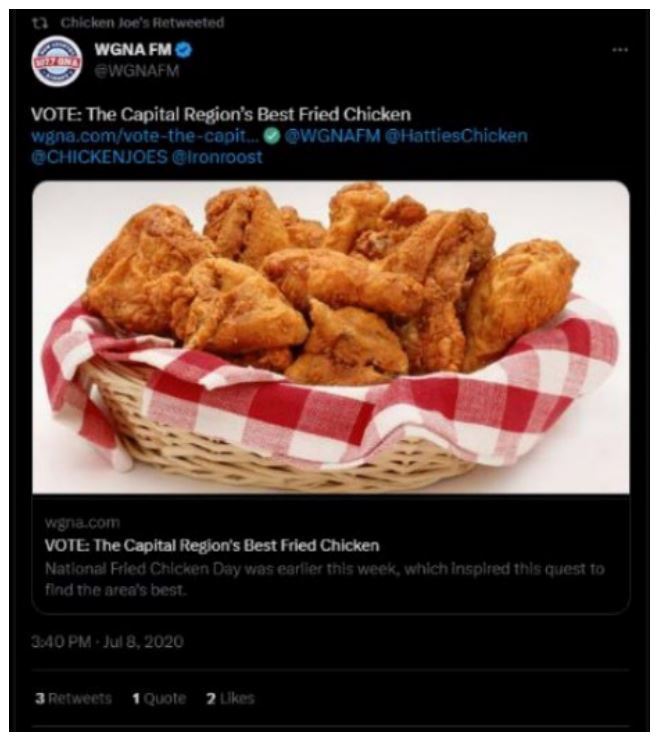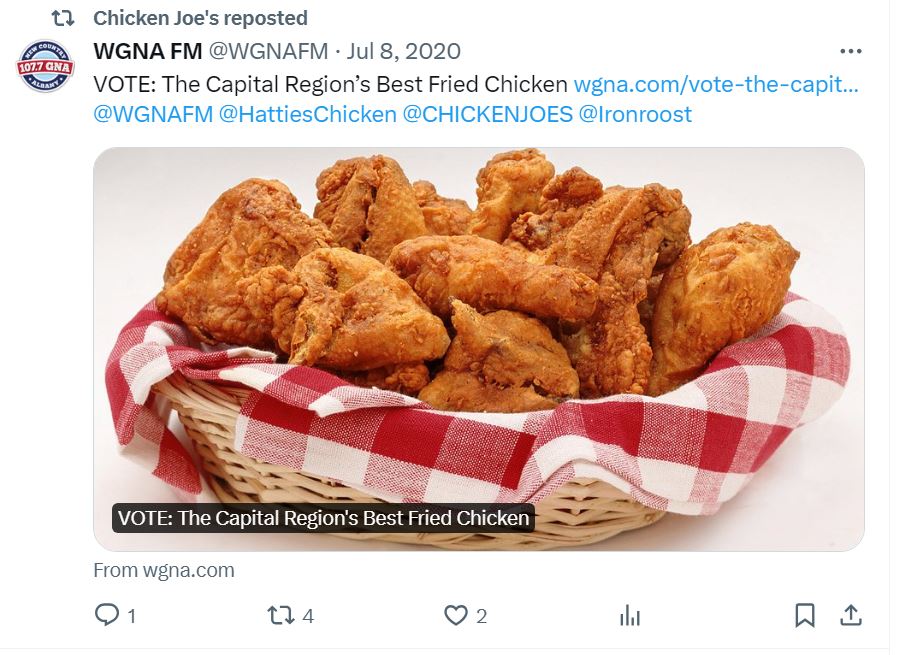Retweeting as Copyright Infringement–Prepared Food Photos v. Chicken Joe’s
The issue is, what is (the copyright implication of retweeting a photo of) chicken? (head nod to Judge Friendly).
* * *
The plaintiff allegedly licenses a photo database to grocery stores for $12k/yr. The case involves one of those photos, evocatively named “ChickenFried013.” Chicken Joe’s, an Albany NY-based restaurant “reposted” @WGNAFM’s post, which apparently included the photo in question, to its “social media” page. The plaintiff doesn’t indicate whether or not WGNAFM’s photo usage was licensed, but the court seemingly wouldn’t care if it was. The plaintiff sued Chicken Joe’s for the “repost.” The restaurant no-showed, leading to a default judgment against it.
Here is the court’s depiction of the “social media” post:
For unclear reasons, the court doesn’t specify the “social media” at issue here, and the image above is poor enough that it wasn’t clear. However, with a minimal amount of sleuthing, I was able to confirm that the “social media” is Twitter. Here is the original retweet as it appears now, easier to read and reflecting some of Twitter’s product “enhancements” since 2020:
Thus, this case raises the issue of whether a retweet can constitute copyright infringement. From my perspective, this is an easy call. Retweeting doesn’t infringe the original tweet (or any infringing content in that tweet) because the retweet simply creates a link to the original tweet. This then merges with the “embedding” analysis (e.g., Hunley v. Instagram), where embedding isn’t an infringement. Instead, citing possibly deprecated law from Goldman v. Breitbart, the court says that “reposting” on “social media” is enough to find copyright infringement in a default judgment. Crazy.
With respect to willful infringement, the court says:
This Court understands the intent of the statute and the importance of protecting original works, but has concerns about the strict liability standard considering the scope and scale of the social media implications in the context of the Copyright Act. Social media is ubiquitous, as are reposts of content created by other users. An innocent infringer need not be aware of or even have reason to believe their conduct is infringing in order to be liable. A liberal interpretation of the Copyright Act, therefore, could open the floodgates to endless litigation. This is especially salient because many potential defendants could decline to answer because the cost of litigation would likely outweigh the mandatory statutory damages amount.
All excellent points. I’m worried about this too. But the defendant no-showed, so all of these concerns go out the window. Despite its reservations, the court says that this defendant infringed willfully because it responded to the plaintiff’s takedown demand with an “obscene tirade.” Once again, good enough for a default judgment. Crazy.
The court awards $24k in statutory damages (computed as 2x the annual licensing fee for the entire photo database that presumably has thousands of photos) plus another $3,300 in attorneys’ fees and costs. All for a single photo from the database. CRAZY.
Obviously, it’s hard for the defense to complain about the outcome. It no-showed. But the court notes that the plaintiff has gotten other default judgments using similar arguments. This isn’t exactly comforting. Instead, it makes me wonder why the defendants are no-showing. In particular, I wonder exactly how service was made in this and other cases.
If the defendant had showed up and made its case, I’d like to think courts would more carefully scrutinize the legitimacy of a copyright claim over retweeting, especially if Hunley (a 9th Circuit ruling) in practice deprecated the Goldman case (an SDNY ruling). Until the courts start pushing back on the legal theory over retweeting as copyright infringement, the plaintiff has apparently found a profitable seam for a high volume of unmeritorious copyright enforcements. #PossibleCopyrightTrollAlert
[Update: Paul Levy is paying attention to this situation.]
Case Citation: Prepared Food Photos, Inc. v. Chicken Joes, 23-cv-3895 (JGLC) (JW) (S.D.N.Y. Jan. 12, 2024)
Selected Posts on Liability for Retweeting
* Retweets ≠ Endorsements (As a Matter of Law)–Flynn v. CNN
* Section 230 Protects Retweeting–Banaian v. Bascom
* Section 230 Doesn’t Protect Quote-Tweeting–US Dominion v. Byrne
* Retweets Didn’t Reset Defamation Statute of Limitations–Crosswhite v. Reuters
* Can a Retweet Constitute Copyright Infringement? Uh….–Bell v. Chicago Cubs


